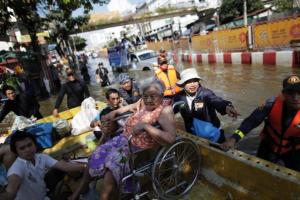
The 6th Asian Ministerial Conference on Disaster Risk Reduction (6th AMCDRR) presents a unique opportunity to ensure that the Asian and Pacific inputs to the Hyogo Framework for Action 2 reflect the importance of disability-inclusive disaster risk reduction. To deliver this message, ESCAP is participating in the pre-conference consultation on disability-inclusive disaster risk reduction (22 June 2014) and in the side-event on “The ‘how-to’ of disability-inclusive DRR: from awareness to action” (23 June 2014).
Asia and the Pacific is the most disaster prone region of the world: people in the region are 30 times more likely to be affected by a disaster than those living in North America or Europe.
Recent data from Japan also confirm that persons with disabilities are four times more likely to die when a disaster strikes, than those without disabilities.
Disasters also cause people to acquire impairments. Evidence shows that at least 6 per cent of all people affected by disasters acquire a physical, cognitive or psychological disability. This means that, during the past decade, around 5 million people in our region have acquired a disability, as a result of a disaster.
The Hyogo Framework for Action 2005-2015 called for stronger social safety nets to assist persons with disabilities affected by disasters. But it fell short of integrating the concerns of persons with disabilities in disaster risk reduction policy and plans.
To address this shortcoming, Goal 7 of the Incheon Strategy to ‘Make the Right Real’ for Persons with Disabilities calls for strengthened disability-inclusive disaster risk reduction planning and for timely and appropriate support to persons with disabilities in responding to disasters.
From the social development perspective, ESCAP is working to ensure that the Asia-Pacific inputs to the next Hyogo Framework for Action are disability-inclusive. The foundation for this support is the Sendai Statement, which was adopted by government and civil society representatives in Sendai, Japan, in March 2014.
The Sendai Statement stresses that disability inclusion in disaster risk reduction is critical for the creation of resilient, inclusive and equitable societies. Participation of persons with disabilities in all stages of disaster risk reduction, especially preparedness, is essential to increase their resilience and survival. At the same time, disability-inclusive disaster risk benefits all persons within the community, including older persons, children, pregnant women, and many other persons who could be under debilitating stress when a disaster strikes.

